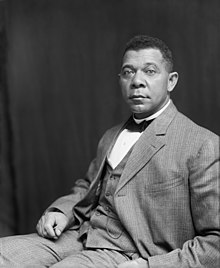

The Atlanta Exposition Speech was an address on the topic of race relations given by African-American scholar Booker T. Washington on September 18, 1895. The speech,[1] presented before a predominantly white audience at the Cotton States and International Exposition (the site of today's Piedmont Park) in Atlanta, Georgia, has been recognized as one of the most important and influential speeches in American history.[2] The speech was preceded by the reading of a dedicatory ode written by Frank Lebby Stanton.[3]
Washington began with a call to the African-American population, who composed one third of the Southern United States, to join the world of work. He declared that the South was where black people were given their chance, as opposed to the North, especially in the worlds of commerce and industry. He told the white audience that rather than relying on the immigrant population arriving at the rate of a million people a year, they should hire some of the nation's eight million African-American population. He praised black peoples’ loyalty, fidelity and love in service to the white population, but warned that they could be a great burden on society if oppression continued, stating that the progress of the South was inherently tied to the treatment of black people and protection of their liberties.
He addressed the inequality between commercial legality and social acceptance, proclaiming that "The opportunity to earn a dollar in a factory just now is worth infinitely more than the opportunity to spend a dollar in an opera house." Washington also promoted segregation by claiming that blacks and whites could exist as separate fingers of a hand.
The title "Atlanta Compromise Speech" was given to the speech by W. E. B. Du Bois, who believed it was insufficiently committed to the pursuit of social and political equality for African Americans.
Although the speech was not recorded at its initial presentation in 1895, Washington recorded a portion of the speech during a trip to New York in 1908. This recording has been included in the United States National Recording Registry.[4]
- ^ Text of Atlanta Compromise Speech
- ^ "Atlanta Compromise Speech". New Georgia Encyclopedia. Archived from the original on July 8, 2007. Retrieved June 8, 2007.
- ^ Stanton's ode began with "Behold To-Day the Meeting of the Lands" (see "South's New Epoch" article from the New York World, 1895 September 18, in the Papers of Booker T. Washington 1895–1898, pp. 3–15). Archived 2011-06-04 at the Wayback Machine
- ^ Moore, Jacqueline (2002). "Booker T. Washington's 1895 Atlanta Exposition Speech (1908 recreation)" (PDF). Library of Congress. Retrieved January 18, 2020.
